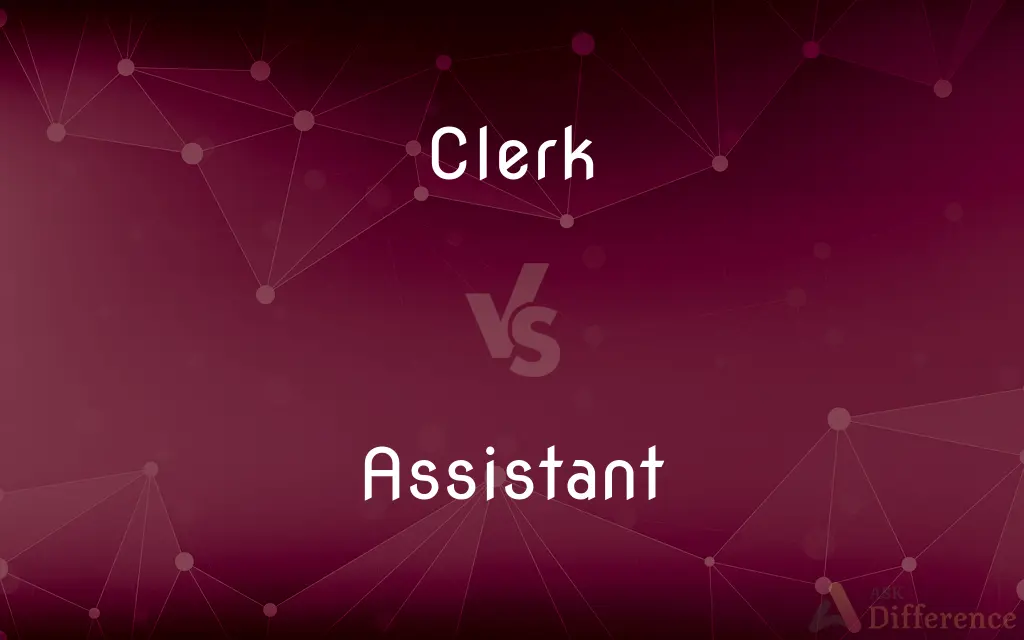Clerk vs. Assistant — What's the Difference?
By Tayyaba Rehman & Fiza Rafique — Updated on April 2, 2024
Clerk focuses on administrative or sales tasks within an office or store, while Assistant supports specific individuals or teams, often with a wider range of duties.

Difference Between Clerk and Assistant
Table of Contents
ADVERTISEMENT
Key Differences
A clerk typically refers to an employee who performs administrative or clerical duties, such as filing, maintaining records, or handling financial transactions. These roles are often specific to certain departments or functions within an organization. In contrast, an assistant supports specific individuals, such as executives or professionals, or teams, and may perform a broader range of duties, including scheduling, communication, and project management tasks.
Clerks are commonly found in various settings, including retail stores, where they might manage transactions and customer service, and in offices, where they handle paperwork and data entry. Assistants, on the other hand, are more closely associated with providing direct support to higher-level staff or managers, often taking on responsibilities that facilitate the workflow of the person or team they are assisting.
The role of a clerk is usually defined by a set routine or set of tasks, emphasizing efficiency and accuracy, particularly in handling information or transactions. Meanwhile, an assistant's role can be more dynamic, adapting to the needs of their supervisors, which may change day to day or require a higher level of initiative and problem-solving skills.
In terms of career development, being a clerk can offer specialized knowledge and experience in specific administrative functions or sectors, such as legal, medical, or governmental clerical work. An assistant role, especially when linked to a high-level executive, might provide broader exposure to strategic aspects of a business or organization, potentially opening doors to advanced administrative or managerial career paths.
Clerk positions are often seen as entry-level or mid-level jobs within the organizational hierarchy, focusing on the operational aspects of a business or office. Assistants, especially executive assistants, might hold more influence or authority within an organization, acting as the right hand of the person or team they support, and often involved in decision-making processes.
ADVERTISEMENT
Comparison Chart
Primary Focus
Administrative or sales tasks
Support for specific individuals or teams
Common Settings
Retail stores, offices
Executive offices, professional settings
Duties
Filing, record-keeping, transactions
Scheduling, communication, project management
Role Characteristics
Defined routine, emphasis on efficiency and accuracy
Dynamic, adaptable, initiative-driven
Career Development
Specialized knowledge in administrative functions
Exposure to strategic business aspects
Organizational Level
Entry-level to mid-level
Can be mid-level to high-level, depending on the role
Compare with Definitions
Clerk
Handles specific administrative tasks.
The clerk is responsible for processing all incoming mail and filing documents.
Assistant
Offers a closer look at the strategic operations of a business.
As an assistant to the director, they participated in planning meetings and contributed ideas.
Clerk
Gains expertise in clerical or administrative areas.
The legal clerk specialized in court document filings and legal correspondence.
Assistant
Provides personalized support to executives or teams.
The executive assistant managed the CEO’s calendar and coordinated travel arrangements.
Clerk
Often found in retail, managing transactions and customer interactions.
The store clerk helped customers find products and handled the checkout process.
Assistant
Engages in a wide range of support tasks beyond clerical work.
The assistant to the marketing team helped organize campaigns and communicate with vendors.
Clerk
Prioritizes operational efficiency and data accuracy.
The accounting clerk meticulously updated financial records to ensure accuracy.
Assistant
Adapts to changing needs and shows initiative.
The assistant proactively resolved scheduling conflicts and prepared meeting materials.
Clerk
Plays a crucial role in the operational aspects of an organization.
The inventory clerk managed stock levels and ordering processes for the warehouse.
Assistant
May hold influence by acting on behalf of their supervisor.
The personal assistant often made decisions on minor matters to free up the executive’s time.
Clerk
A clerk ( or ) is a white-collar worker who conducts general office tasks, or a worker who performs similar sales-related tasks in a retail environment. The responsibilities of clerical workers commonly include record keeping, filing, staffing service counters, screening callers, and other administrative tasks.
Assistant
One that assists; a helper.
Clerk
A person employed in an office or bank to keep records, accounts, and undertake other routine administrative duties
A bank clerk
A wages clerk
Assistant
Holding an auxiliary position; subordinate.
Clerk
A receptionist in a hotel
She approached the desk and the clerk looked down at her
Assistant
Giving aid; auxiliary.
Clerk
A member of the clergy.
Assistant
Having a subordinate or auxiliary position.
An assistant surgeon
Clerk
A literate or scholarly person.
Assistant
Helping; lending aid or support; auxiliary.
Clerk
Work as a clerk
Eleven of those who left college this year are clerking in auction stores
Assistant
(obsolete) Someone who is present; a bystander, a witness.
Clerk
A person who works in an office performing such tasks as keeping records, attending to correspondence, or filing.
Assistant
A person who assists or helps someone else.
Clerk
A person who keeps the records and performs the regular business of a court, legislative body, or municipal district.
Assistant
(British) Sales assistant.
Clerk
(Law) A law clerk, as for a judge.
Assistant
A software tool that provides assistance in some task, a wizard program.
Clerk
A person who works at a sales counter or service desk, as at a store or hotel.
Assistant
Helping; lending aid or support; auxiliary.
Genius and learning . . . are mutually and greatly assistant to each other.
Clerk
A cleric.
Assistant
Of the second grade in the staff of the army; as, an assistant surgeon.
Clerk
(Archaic) A scholar.
Assistant
One who, or that which, assists; a helper; an auxiliary; a means of help.
Four assistants who his labor share.
Rhymes merely as assistants to memory.
Clerk
To work or serve as a clerk
Clerked in a store.
Clerks for a judge.
Assistant
An attendant; one who is present.
Clerk
One who occupationally provides assistance by working with records, accounts, letters, etc.; an office worker.
Assistant
A person who contributes to the fulfillment of a need or furtherance of an effort or purpose;
My invaluable assistant
They hired additional help to finish the work
Clerk
A salesclerk; a person who serves customers in a store or market.
Assistant
Of or relating to a person who is subordinate to another
Clerk
A law clerk.
Clerk
An employee at a hotel who deals with guests.
Clerk
(Quakerism) A facilitator of a Quaker meeting for business affairs.
Clerk
(archaic) In the Church of England, the layman that assists in the church service, especially in reading the responses (also called parish clerk).
Clerk
(dated) A cleric or clergyman (the legal title for clergy of the Church of England is "Clerk in Holy Orders", still used in legal documents and cherished by some of their number).
Clerk
(obsolete) A scholar.
Clerk
To act as a clerk, to perform the duties or functions of a clerk
The law school graduate clerked for the supreme court judge for the summer.
Clerk
A clergyman or ecclesiastic.
All persons were styled clerks that served in the church of Christ.
Clerk
A man who could read; a scholar; a learned person; a man of letters.
He was no great clerk, but he was perfectly well versed in the interests of Europe.
Clerk
A parish officer, being a layman who leads in reading the responses of the Episcopal church service, and otherwise assists in it.
And like unlettered clerk still cry "Amen".
Clerk
One employed to keep records or accounts; a scribe; an accountant; as, the clerk of a court; a town clerk.
The clerk of the crown . . . withdrew the bill.
Clerk
An assistant in a shop or store.
Clerk
An employee who performs clerical work (e.g., keeps records or accounts)
Clerk
A salesperson in a store
Clerk
Work as a clerk, as in the legal business
Common Curiosities
What is a clerk?
A clerk performs administrative or sales-related tasks within an office or store.
What industries do clerks work in?
Clerks work in various industries, including retail, healthcare, legal, and government sectors.
What qualities are important for a clerk?
Efficiency, accuracy, and attention to detail are crucial for clerks.
Can the role of an assistant be strategic?
Yes, especially for executive assistants who work closely with senior management.
Do assistants have decision-making power?
Assistants may have limited decision-making power, particularly in managing schedules or minor tasks on behalf of their supervisors.
What does an assistant do?
An assistant supports specific individuals or teams, handling a wide range of tasks from scheduling to project management.
Can a clerk become an assistant?
Yes, clerks can transition to assistant roles, especially if they develop skills that align with supporting specific individuals or teams.
Is being an assistant a higher position than a clerk?
It can be, especially if the assistant role involves supporting high-level executives or managers.
Do assistants need specialized skills?
Yes, assistants often need strong organizational, communication, and problem-solving skills.
Are clerk positions entry-level?
Many clerk positions are considered entry-level, offering a pathway to more specialized or higher roles.
How does one become a clerk?
Becoming a clerk typically requires a high school diploma and training in administrative tasks or specific software.
What is the key difference between a clerk and an assistant?
The key difference is their focus: clerks concentrate on administrative tasks, while assistants provide broader support to individuals or teams.
What is the most challenging part of being an assistant?
The most challenging part can be managing the dynamic and sometimes unpredictable needs of the person or team being supported.
What makes a good executive assistant?
A good executive assistant is highly organized, discreet, and capable of managing complex schedules and tasks.
How can someone excel as an assistant?
By being adaptable, proactive, and able to anticipate the needs of those they support.
Share Your Discovery

Previous Comparison
Aldehyde vs. Amide
Next Comparison
Leviathan vs. SerpentAuthor Spotlight
Written by
Tayyaba RehmanTayyaba Rehman is a distinguished writer, currently serving as a primary contributor to askdifference.com. As a researcher in semantics and etymology, Tayyaba's passion for the complexity of languages and their distinctions has found a perfect home on the platform. Tayyaba delves into the intricacies of language, distinguishing between commonly confused words and phrases, thereby providing clarity for readers worldwide.
Co-written by
Fiza RafiqueFiza Rafique is a skilled content writer at AskDifference.com, where she meticulously refines and enhances written pieces. Drawing from her vast editorial expertise, Fiza ensures clarity, accuracy, and precision in every article. Passionate about language, she continually seeks to elevate the quality of content for readers worldwide.















































